|
|
|
Sort Order |
|
|
|
Items / Page
|
|
|
|
|
|
|
| Srl | Item |
| 1 |
ID:
169012
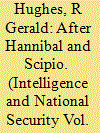

|
|
|
|
|
| Summary/Abstract |
‘I sincerely hope that they (relations between India and Pakistan) will be friendly and cordial. We have a great deal to do, both states, and I think that we can be of use to each other (and to) the world.’ Muhammad Ali Jinnah (1876–1948).1 ‘Intelligence links between neighbours are obviously desirable. It is better to institutionalise them now, rather than trying to activate them in times of crisis (that is why they failed in [the terrorist attacks of] 26/11).2 In due course, both sides would understand the need for ‘open’ intelligence posts in diplomatic missions. In the meantime, petty harassment of each other’s officers and staff could end. Intelligence links can succeed where all others fail. What agencies can achieve is not at times even conceivable in political or diplomatic channels.’ A.S. Dulat and Asad Durrani.3
|
|
|
|
|
|
|
|
|
|
|
|
|
|
|
|
| 2 |
ID:
192595
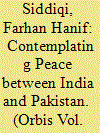

|
|
|
|
|
| Summary/Abstract |
India-Pakistan relations are at an inflection point with India’s dramatic revocation of Kashmir’s autonomy and its desired objective to transform the nature of the Kashmir conflict from a “bilateral” (involving Pakistan) to a “unilateral” status (excluding Pakistan). Pakistan, on the other hand, has embarked on a diplomatic offensive making the case against India’s majoritarian politics in Kashmir as detrimental not only to the Kashmiris but also to the strategic stability between the two rivals. This article reasons that India’s and Pakistan’s dominant zero-sum strategies—premised on winning while ensuring the other’s loss—are least likely to come to fruition. Given the present nature of ties, the way forward is for the two states to engage in a minimalist framework where mutual interests, as opposed to dominant positions, are put forth as a basis for engagement. Second, engagement more than agreement should be the short- to medium-term goal. Finally, any talk during this time on freezing the Kashmir conflict is least likely to bring any long-term dividends for peace and stability between the two regional adversaries.
|
|
|
|
|
|
|
|
|
|
|
|
|
|
|
|
| 3 |
ID:
148536
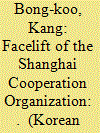

|
|
|
|
|
| Summary/Abstract |
For the past 15 years, the Shanghai Cooperation Organization (SCO) has preserved its non-Western (and sometimes anti-Western) identity and its policy toward the West has been based on a “soft-balancing” strategy. This paper aims to examine the SCO`s identity positioning and understand the implications of its strategy and policy toward the West in terms of three recent global events relating to the SCO. India`s membership effect will be able to soften the SCO`s image of the club of authoritarian states or an anti-Western group as well as to make less-assertive its non-Western identity. China`s economic power projection aiming at the “peaceful rise” is inclined to make the SCO`s identity less anti-Western. Russia`s policy of expanding partners and widening cooperation in greater Eurasia is also likely to weaken not only the rhetoric, but also the substance of the anti-Western narrative. The SCO`s shift of identity positioning, in general, from the non-Western to a less assertive non-Western is likely to soften the SCO`s soft balancing against the West, and the anticipated range and effect of the softer balancing could be greater due to the widened platform and the improved image.
|
|
|
|
|
|
|
|
|
|
|
|
|
|
|
|
| 4 |
ID:
133438
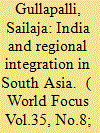

|
|
|
|
|
| Publication |
2014.
|
| Summary/Abstract |
Almost two decades ago, India unveiled its 'looks East Policy" to enhance its trade and commercial relations with the countries of the South East Asian Region. Infact, it vigorously pursued its entry in to the regional group and by December, 2012, it did achieve much progress by taking the economic relations to further levels. From being a sectoral dialogue partner to forging free-trade agreement, India has come a long way in the pursuit of its economic interests.
|
|
|
|
|
|
|
|
|
|
|
|
|
|
|
|
| 5 |
ID:
040544
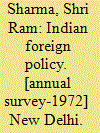

|
|
|
|
|
| Publication |
New Delhi, Sterling Publishers, 1972.
|
| Description |
x, 366p.
|
| Standard Number |
0800201914
|
|
|
|
|
|
|
|
|
|
|
|
Copies: C:1/I:0,R:0,Q:0
Circulation
| Accession# | Call# | Current Location | Status | Policy | Location |
| 016560 | 327.54/SHA 016560 | Main | On Shelf | General | |
|
|
|
|
| 6 |
ID:
006260
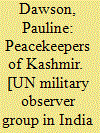

|
|
|
|
|
| Publication |
Bombay, Popular Prakashan, 1995.
|
| Description |
xxii, 337p.
|
| Standard Number |
8171545815
|
|
|
|
|
|
|
|
|
|
|
|
Copies: C:1/I:0,R:0,Q:0
Circulation
| Accession# | Call# | Current Location | Status | Policy | Location |
| 037689 | 341.58409546/DAW 037689 | Main | On Shelf | General | |
|
|
|
|
| 7 |
ID:
128830
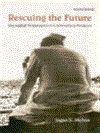

|
|
|
|
|
| Publication |
New Delhi, Manohar Publishers and Distributors, 2008.
|
| Description |
487p.Hbk
|
| Standard Number |
8173047529
|
|
|
|
|
|
|
|
|
|
|
|
Copies: C:1/I:0,R:0,Q:0
Circulation
| Accession# | Call# | Current Location | Status | Policy | Location |
| 057618 | 327.54/MEH 057618 | Main | On Shelf | General | |
|
|
|
|
| 8 |
ID:
163773
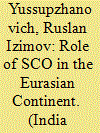

|
|
|
|
|
| Summary/Abstract |
With an official accession of India and Pakistan to Shanghai Cooperation Organisation (SCO), its capacity has considerably increased. The organisation has also faced new challenges, to which the member states must respond rapidly. Thus, the expansion of the list of members blurs to a large extent the SCO area of efforts application. A traditional spotlight, shining for a long time on Central Asia, will be now inevitably shifted towards South Asia. The task of maintaining the basic principles of the SCO functioning and the balance of forces between the major and other members in the Organization, as well as the need for solving the most topical issue for today, the creation of mechanisms for financing the SCO projects, remain no less important in the light of the SCO expansion.
|
|
|
|
|
|
|
|
|
|
|
|
|
|
|
|
|
|
|
|
|